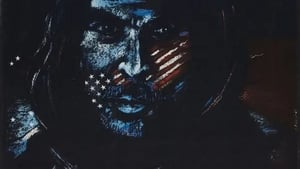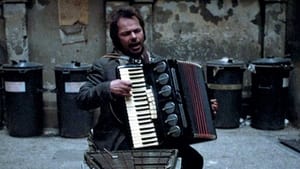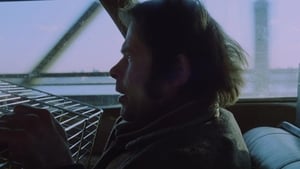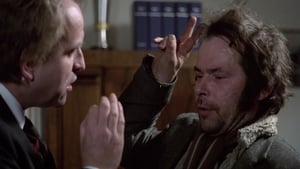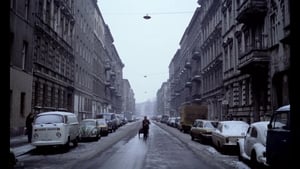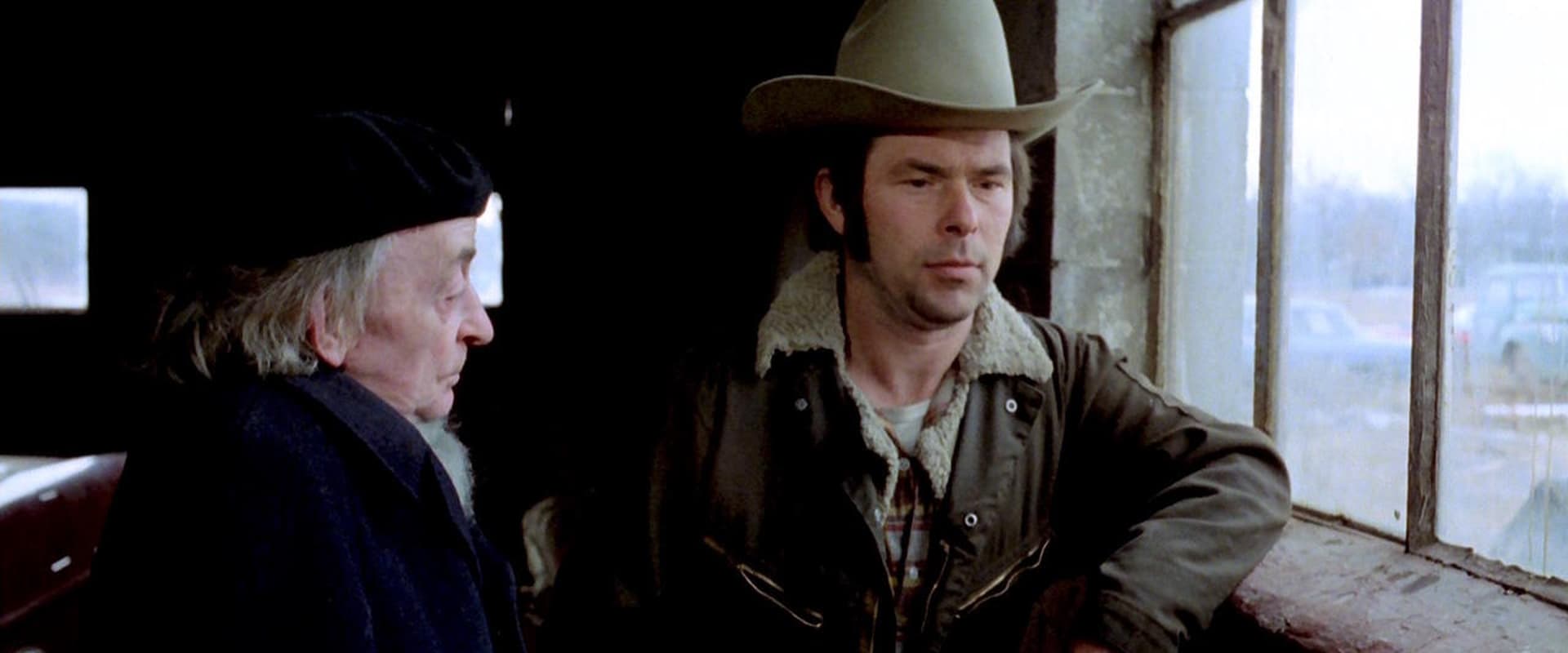

Genre: Drama / Komedie
Speelduur: 115 minuten
Oorsprong:
West-Duitsland
Geregisseerd door: Werner Herzog
Met onder meer: Bruno S., Eva Mattes en Clemens Scheitz
IMDb beoordeling:
 7,7 (16.341)
7,7 (16.341)
Gesproken taal: Engels, Duits en Italiaans
On Demand:
 Niet beschikbaar op Netflix
Niet beschikbaar op Netflix Niet beschikbaar op Pathé Thuis
Niet beschikbaar op Pathé Thuis Niet beschikbaar op Videoland
Niet beschikbaar op Videoland Niet beschikbaar op Prime Video
Niet beschikbaar op Prime Video Niet beschikbaar op Disney+
Niet beschikbaar op Disney+ Niet beschikbaar op Google Play
Niet beschikbaar op Google Play Niet beschikbaar op meJane
Niet beschikbaar op meJane
Plot Stroszek
"A Ballad"
Bruno Stroszek is vrijgelaten uit de gevangenis en vertelt te stoppen met drinken. Hij heeft maar weinig vaardigheden en nog minder verwachtingen. Met een klokkenspel en een accordeon probeert hij te overleven als straatmuzikant. Hij raakt bevriend met Eva, een prostituee. Nadat zij afgetuigd zijn door de pooier van Eva verlaten zij samen met de buurman van Bruno, Scheitz, Duitsland om verder te leven in Wisconsin in de VS. Het leven daar zal echter ook niet zonder problemen zijn.
Externe links
Acteurs en actrices
Bruno Stroszek
Eva
Scheitz
Souteneur
Pimp #2
Mechanic
Mechanic's Assistant
Prison Warden
Bank Teller
Pimp #3
Video's en trailers
Reviews & comments
Co Jackso
-
- 21924 berichten
- 2791 stemmen
Na vele Herzog films, ben ik weer eens beland bij één van zijn hoogtepunten. Het op het oog simpele verhaal wordt in dit geval op zeer krachtige manier uitgewerkt. Hoewel vele factoren hier voor zorgen, is er één die erboven uitsteekt, en dat is het acteerwerk van Bruno S. Hij speelt bij wijze van spreken de sterren van de hemel, zien is geloven.
Compliment ook voor Herzog die het wederom voor elkaar krijgt om een groot aantal zeer overtuigende bijrol acteurs te vinden die allen iets toevoegen aan het verhaal. En natuurlijk voor het laatste gedeelte van de film inclusief de laatste scène die niet snel vergeten zal worden.
JJ_D
-
- 3815 berichten
- 1344 stemmen
Bij het zien van 'Stroszek' moest ik spontaan denken aan een bericht van fredpit (op MusicMeter), bij het album 'Ascension' (Coltrane):
Is dit mooi ? lelijk ? goed ? waanzin ? geniaal of een grote grap ?
Vragen, vragen, vragen
 ....overdonderend,ongrijpbaar en, ik geef het toe, onbegrijpbaar...
....overdonderend,ongrijpbaar en, ik geef het toe, onbegrijpbaar...Sommigen (ik dus niet) kunnen blijkbaar best overweg met dat "ongrijpbare". In de muziek (op zich al een abstract medium) kan ik dat nog begrijpen, bij film veel minder.
Wat bedoelt Herzog? Waarover gaat dit (van dierlijke mishandeling in West-Duitsland (?) tot een uitstapje naar 'the American dream' - gedoemd om slecht af te lopen)? Waarin schuilt de emotie? Onder welke esthetische stroming schaart Herzog zich als regisseur?
Ondanks zijn talloze vragen heeft 'Stroszek' met niet overdonderd. Wel geïrriteerd en verveeld.
Niettegenstaande beschouw ik deze film (tevens mijn eerste speelfilm van Herzog) als een interessant experiment, dat binnen 5 jaar misschien wel de juiste gevoelens zal kunnen losweken. Op dit moment kan ik hier echter niks mee.

The One Ring
-
- 29974 berichten
- 4109 stemmen
Ik moet wel zeggen dat dit een film is die gigantisch blijft hangen. Het is toch wel een bijzonder werkje en met name Bruno S. zal ik wellicht nooit vergeten. Ik verhoog mijn stem met een halve ster.
Poisonthewell
-
- 4939 berichten
- 13389 stemmen
Dit schreef ik een paar maandjes terug over Stroszek voor een opdracht op school, waarbij vooral de wederzijdse culturele invloed aan bod diende te komen. In het Engels, maar daar kunnen de meeste wel mee overweg toch? Copyright @ me  Nou ja, niet echt natuurlijk. Anyway:
Nou ja, niet echt natuurlijk. Anyway:
(het hele zootje tussen spoiler tags, want ik verwijs constant naar plotverwikkelingen)
Transatlantic Ties – Research Paper
Christ-Jan Goos 0309419
Stroszek: A Film by Werner Herzog
(Starring: Bruno S., Eva Mattes, Clemens Scheitz, Clayton Szalpinski and Scott McKain)
The Film: Plot and Background Information
Werner Herzog’s extraordinary 1977 film is a highly unusual, yet extremely fascinating portrait of three unlikely friends who travel across the Atlantic in search of a better life. While undoubtedly one of the great masterpieces brought forth by the cinematic counterpart of Die Neue Welle, the New German Cinema (the revival of German cinema in late 60s and 70s headed by Herzog, Fassbinder, Wenders, Schlöndorff and Von Trotta), it is also one of the strangest films ever made. Its bizarre tone makes it funny, but ultimately it is a deep sense of tragedy that prevails. One popular legend connected with Stroszek is the fact that Joy Division front man Ian Curtis reportedly killed himself just hours after watching the movie on television; a rumor not at all implausible to anyone who has seen it.
The movie juxtaposes two wildly different, yet in some ways frustratingly similar worlds on opposite ends of the earth; Cold War-era Berlin and a fictitious town called Railroad Flats, Wisconsin. A mere description of the plot would not do the film justice, especially since it does not adhere to traditional narrative structure. The central character is Bruno (all the actors use their real names for their characters), a mentally retarded street musician who has just been released from prison, after serving time for alcohol-related offences. His neighbor, the elderly Herr Scheitz, has kept his apartment for him while he was away. Together with their mutual friend Eva, a prostitute who suffers severe physical abuse at the hands of her pimps, they decide to cross the pond at the invitation of Scheitz’ American nephew Clayton, a small-town car mechanic who runs a garage somewhere in central Wisconsin. They take out a loan to purchase an enormous 70-foot trailer for them to live in; the first step towards a new life. But Bruno remains skeptical, and, as it turns out, not without reason, because things inevitably fall apart, setting the movie up for one of the oddest final sequences in the history of cinema. I will reveal it here, since I will refer to it later on. After Eva runs off to Canada with a bunch of truckers, and the trailer is repossessed, Bruno and Scheitz set out to rob a bank. The bank, however, happens to be closed, so they rob the barbershop next door of 32 dollars. Rather than leaving the scene, the pair wanders across the street to a grocery store, where they leisurely stock up on supplies. Herr Scheitz is arrested, but Bruno gets away, taking Clayton’s rusty, dilapidated old pick-up truck, and sets out for an aimless odyssey across the sad, wintry landscape of the Mid-West, armed with a shotgun, a frozen turkey and a few cans of beer. Eventually the truck breaks down in a small town in North Carolina, where, after frantically depositing quarters into several attractions of a cheap amusement arcade (including ‘the drumming duck’, ‘the fire-fighter rabbit’, and the infamous ‘dancing chicken’), Bruno takes the turkey and the shotgun on a ski-lift, where he shoots himself off-camera. The movie ends with an extended shot of the ceaselessly dancing chicken, which Herzog himself thought a ‘great metaphor’, although he was never sure what exactly it was for.
Herzog wrote the screenplay for the movie in four days. This was possible, he explains on the DVD commentary track , because he already had its location in mind; he found that the story more or less ‘wrote itself’ after that. This location was Plainfield, Wisconsin, the home town of the infamous serial killer and necrophiliac Ed Gein (who was the inspiration for Norman Bates in Psycho). After missing an appointment he had there with American documentary filmmaker Errol Morris, Herzog drove around the area, until his car broke down. The mechanic who fixed his car was Clayton Szalpinski, who wound up playing himself in the film. But Szalpinski is not the only non-actor in Stroszek; all the extras are untrained locals. The truckers at the truck stop where Eva finds a job as a waitress are real, the hunters to whom Herr Scheitz tries to convey his dubious theories on animal magnetism are real, and even the thugs that ultimately cause the threesome to flee Berlin are a real-life former pimp and convicted bank robber. And of course Bruno S. himself is a sight to behold. Herzog cast him two years earlier in his equally brilliant film Jeder für Sich und Gott gegen Alle, after having seen him perform as a street musician on a television documentary. Having been severely abused as a child, and, as a result, having been brought up in several mental institutions where he lived until he was 26, Bruno S. brings a mysterious and intangible quality to his acting that no professional actor could ever hope to imitate. A trademark of the films of Werner Herzog is that he likes to blur the lines between fiction and reality, and in Stroszek, the combination of real people and real locations (which were previously unseen on the silver screen) lends the film, which is ultimately a work of fiction, a wonderful air of authenticity.
Although a product of the New German Cinema movement, the film has thematically just as much in common with a certain number of American movies of the post-hippie era. The sentiments expressed in independent, off-beat films about such topics as alienation, restlessness, disillusionment, hopelessness, freedom and mobility, such as Easy Rider (1969), Two-Lane Blacktop (1971), and Bob Rafelson’s masterpiece Five Easy Pieces (1970) are not far removed from those expressed in Stroszek. The film’s most famous shot, that of the trailer being towed off the land, which is held for a painfully long time, might arguably mirror the equally famous and equally lengthy final shot of Five Easy Pieces. Yet Stroszek is different, because it adds the observational quality inevitable in a foreign production. Is it a critique of the illusion of the American Dream? Perhaps, but however disappointing the New World turns out to be for the characters, ‘German society comes out looking worse, and all of the Americans seem naïve, simple and nice’ (Ebert, 435). One of the key aspects of The American Temptation that Richard Kuisel deals with in his book is the ever-present sense of optimism. In Stroszek, this is illustrated by the fact that all American characters in the film, from Clayton to the bank representative, ultimately boast an outlook on life that is positive beyond doubt.
The American Dream
Of the three main characters, Eva is the one who has the most vivid image and the highest expectations of what will hopefully await them in the land of opportunity. But in what way is her version of the American Dream different from the traditional one, and how was this vision instilled in her? Bruno, on the other hand, remains indifferent; an attitude which, had it not been for his impaired mental faculties, might otherwise be interpreted as severe cynicism.
Eva is the only one who has any preconceived notions of the United States. Peering over a map, which, given the state the atlas is in, can only be hopelessly dated, she talks of places like Chicago, California and New York; places that obviously have gained some sort of mythical status in her imagination. She does not know anything about those places, except that they stand for something which cannot be clearly defined. But they hold a promise of some sort. She goes on to tell Bruno and Scheitz that ‘everyone makes money there, so we’ll manage too.’ For most Americans, the American Dream has become synonymous with the popular rags-to-riches myth, and is concerned not so much with the pursuit of happiness as it is with the pursuit of wealth. Eva makes it clear early on that her version, too, is a materialistic one. The sequence in which the three of them drive from New York to Wisconsin is accompanied by a Chet Atkins song, which, as Herzog admits, is supposed to mirror and romanticize ‘their cheap version of the American Dream’ (Later on, Herzog uses the same song, but this time in order to evoke a sad, melancholy mood). However, once they have established themselves in Wisconsin, it soon becomes evident to the audience (and gradually to Eva herself as well) that her notions of the possibilities that lie before them are gravely misguided. She is convinced that riches can be attained by working as a waitress in a truck stop. When the trailer arrives, and the three of them settle in, Eva is overjoyed, jumping on the bed and dancing with the car mechanic, seemingly under the impression that some kind of great progress has been made in their quest for a prosperous life free of sorrow. As Norman Hill points out on the commentary track; even though Eva is absolutely sincere in her display of happiness, to an American audience member, this scene might play as very cynical. The fact that a waitressing job and a mobile home would be a symbol of hope and a sign of better things to come cannot help but be interpreted as anything other than mockery, had this scene been part of a domestic film. But for the German immigrants, it is in fact a step up on the ladder of success. The trailer is a genuine status symbol, at least to Eva. Her dream, however, starts to fall apart as the overly polite bank clerk starts showing up at their door, courteously demanding that they meet their payments. To supplement her meagre income, she relapses into practising her old trade. The very thing that made her run away from Berlin in the first place is now once again part of her life, and the differences between the old world and the new gradually fade away. Eva eventually runs off with two truckers headed for Vancouver. What it is exactly that she expects to come of this is unclear, but her disappointment over her crushed dreams is evident as she seemingly sets herself up for what is likely to become an endless pattern of running away from disillusionment, unavailingly pursuing the white whale of bliss.
Americanization
One valid question that might come to mind is to what extent Eva’s disappointment is the result of her distorted conception of what the American Dream is really all about (as opposed to the notion of American society being actually flawed and unable to meet the promises and expectations it bestows on people at home and abroad). And to what extent is she herself to blame for her naiveté concerning the line between idle hope and reality? Where did she even obtain her impressions of America? She speaks English, and although this could theoretically be the result of any number of things, it is most likely the consequence of spreading Americanization in Cold War Germany. In her article Anti-Americanization in Germany, Mary Nolan talks about the rapid rise of the consumer society in Europe during the Cold War era, claiming that Germany was at this time the most Americanized of all countries in the continent. Eva would by all means fit the description of the target audience for American consumerism. This would account for Eva’s fascination with the United States, as well as the fact that her impressions are shallow and unrealistic, as images brought forth by popular culture invariably tend to be. However, for narrative purposes, the movie is careful not to plant any obvious references to ‘American’ consumerism in the scenes taking place in Berlin; this would defeat the contrast Herzog tries to establish which serves as an incentive for them to leave Germany and head for America. Although Eva’s character has undoubtedly fallen under the spell of Americanization, abundant allusions to this might give rise to question that, if Germany is indeed the ‘mini-America’ that Nolan speaks off, then why would the three main characters, and Eva in particular, even want to leave? Norman Hill points out that Herzog aimed specifically to portray Berlin as being an unpleasant, ‘claustrophobic’ city, which would provide the characters with the motivation to decide on the trip.
On a side note, the only abundant displays of materialism in the Berlin scenes are ironically to be found in connection with the pimps, whose physical and psychological abuse is the immediate reason for the main characters’ departure. With their fur coats and sports cars they present a fearsome image, fleeing from which is by far the most desirable option.
Anti-Americanism
If Eva is the only one who harbors a clear vision of the American Dream, why do Bruno and Scheitz not? In the case of Scheitz, the answer is simple. By virtue of his age, he simply predates the influx of popular Americanization during the 1950s and 1960s. In intellectual circles, the very phenomenon of Americanization had of course been identified and commented upon long before the outbreak of the Cold War, but as Scheitz is rather simple-minded, it is not likely that he ever gave the concept of America even a second thought. The case of Bruno is a little more complicated. His indifference as to his fate might account for why he agreed to come along, but for him, the main reason to leave is the harassment he is forced to undergo at the hands of Eva’s pimps; he expresses no desire to go to America specifically. Although he is of course enticed by Eva’s projections of wealth and happiness, he is reluctant to indulge in any kind of optimism, and even when they arrive in what is to be their new home, Bruno ‘looks as if he has long been expecting the worst to happen’ (Ebert, 431). He predicts the repossession of their home, yet unlike Eva, he has no place to run to. When things go awry, it is Bruno who is hit hardest. He expresses his anger over the pointlessness of their coming here, when he could have experienced the exact same misery at home in Berlin. In fact, America is worse, Bruno argues, because in America, people ‘don’t kick him visibly, but they do it mentally’, which is all the more torturous. What happens in the final sequence, in which he shoots himself on the ski-lift, is perhaps something that he would never have been driven to, had he stayed at home. But how can Bruno’s dreams be crushed, when he never had any to begin with? Is this where the movie’s argument in favor of anti-Americanism, however subtle, is to be found? Germany treated him poorly, and he was not happy there. But America drove him to suicide.
At the time of the film’s release, it was considered by many reviewers to be an attack on American society. In his discussion of the critical response to the recent adaptation of Graham Greene’s novel The Quiet American, Ed Martini points out that movies may become the victim of a simplified, binary model of consciousness, which leaves no room for any grey area . Stroszek may very well be considered a victim of the same narrow-mindedness that Martini speaks of. The film is ambivalent in its attitude towards America, more or less arguing that, although it is true that the image of the country as portrayed in popular culture, whether directly or indirectly, in which it is invariably represented as some sort of promised land where happiness is guaranteed, is flawed, and ultimately at the root of the characters’ downfall, it does not imply that America itself is to blame. The Americans seem to be functioning just fine in their own society, so why are the Germans unable to?
Americanism: Regional Discrepancies?
The following argument does not pretend to transcend the stage of speculation: Herzog’s choice to shoot the film in the rural Mid-West may have something to do with the characters’ disillusionment with life in America. If there is indeed happiness to be found in a life of materialism and consumerism, central Wisconsin is not the place to look for it. It might therefore be unfair to claim that Eva and Bruno are in fact disillusioned by their experiences in America. The term implies a sense of disappointment brought about by the fact that what they found was not the way they pictured it, when actually they never at all found what they were looking for, simply because they were looking in the wrong place. Things might not have turned out the way they did if Bruno, Eva and Scheitz had settled in New York or California, and had been properly exposed to the America and the Americanism that excited their imagination. This is particularly (and perhaps exclusively) plausible in the case of Eva. The only alternative (at least in her own mind) to waitressing is prostitution, whereas countless other options would have presented themselves had they lived in either of the aforementioned locations.
Conclusion
Stroszek is a great film. It explores the implications of transatlantic migration and the inevitable rebuttal of preconceived notions obtained through popular culture. The story unfolds first and foremost on a personal level, but there is a prominent degree of social commentary to be found as well. However, the ambivalence of Herzog’s portrayal of America allows for different points of view as to the extent to which the film criticizes American society. The influence of Americanization on the characters is undeniable; they came to America for a reason.
Works Cited
- Ebert, Roger. The Great Movies II. New York: Broadway Books, 2005.
- Kuisel, Richard F. Seducing the French: The Dilemma of Americanization. Berkeley: University of California Press, 1993.
- Martini, Ed. “‘One Has to Take Sides’: The Quiet American and the War on Terrorism.” ASA 2003; unpublished.
- Nolan, Mary. “Anti-Americanization in Germany.” In Anti-Americanism, edited by Andrew Ross & Kristin Ross, 125-143.
Mug
-
- 13981 berichten
- 5969 stemmen
Interessant (ben op de helft), maar zou je niet ook hier en daar spoilertags willen plaatsen aub. [edit: ah, al gedaan]
Ook in Control, de biopic van Ian Curtis, zijn filmbeelden op een televisietje te zien van Stroszek.
starbright boy (moderator films)
-
- 22394 berichten
- 5066 stemmen
Herzog is een boeiende regisseur. En erg anders dan anderen. Kan me de vergelijking die danuz maakt met Jarmusch maakt wel een beetje voorstellen, maar uiteindelijk is Jarmusch een optimist en soms een romanticus, Herzog niet. Het is ook duidelijk te zien dat de door danuz genoemde Gallo en Korine door hem beinvloed zijn. Om 'm te kunnen plaasten in de Duitse filmgeschiedenis moet ik daar nog meer uit zien.
Dit was weer een buitengewoon boeiende film. Ik heb de twee films van Bruno S. (IMDB vermeldt nog een obscure short) in een paar dagen tijd gezien. En hij domineert deze film nog meer dan de vorige. De man heeft een unieke aantrekkingskracht en speelt een soort van zichzelf. Hij zou vermoedelijk ook niet anders kunnen.
Stroszek is een film over een man die zijn leven bouwt op hoop en over dat dat niet werkt in deze wereld. Een pessimistische film met een hoop menselijkheid. Soms haast documentair, maar tegelijk absurd.
Het Amerikaanse deel vond ik ook beter dan het Duitse en het laatste stuk is ronduit geweldig. Herzog zal me vast niet altijd zo goed bevallen, daarvoor zal hij denk ik te onvoorspelbaar zijn en ik ben wat huiveriger voor zijn grotere films, maar dit was mooi.
4.0*
Mochizuki Rokuro
-
- 18942 berichten
- 16349 stemmen
Herzog zal me vast niet altijd zo goed bevallen, daarvoor zal hij denk ik te onvoorspelbaar zijn en ik ben wat huiveriger voor zijn grotere films, maar dit was mooi.
Tijd geleden dat ik het substantiële deel van Herzogs speelfilms zag. Staat me bij dat dit (samen met Aguirre) mijn favoriet is. Deze zou ik dan ook nóg wel 'ns willen zien. Dat geldt ook voor een heleboel films niet  Wisselvallig is het woord, maar inderdaad ook ongrijpbaar.
Wisselvallig is het woord, maar inderdaad ook ongrijpbaar.
danuz
-
- 12935 berichten
- 0 stemmen
Kan me de vergelijking die danuz maakt met Jarmusch maakt wel een beetje voorstellen, maar uiteindelijk is Jarmusch een optimist en soms een romanticus, Herzog niet. Het is ook duidelijk te zien dat de door danuz genoemde Gallo en Korine door hem beinvloed zijn.
Als je het inderdaad verder bekijkt is er wel een discrepantie tussen Herzogs' (Stroszek) en Jarmuschs' cinema. Jarmusch is inderdaad 'romantischer' en ik denk ook trotser op Amerika, waar Herzog in deze film weinig met het land opheeft (wat het juist ook weer een erg mooi mistroostig/vreemd land maakt).
Korine en Gallo moeten zowaar wel beïnvloed zijn door deze film, de rauwheid en de zelfkant komen best overeen. Alhoewel ze alle drie een echt eigen stijl van werken hebben.
Paalhaas
-
- 1582 berichten
- 2569 stemmen
Nou zeg, was me dit even een aangename verrassing. Wat een onwaarschijnlijk mooi einde heeft deze toch al prachtige film! De soundtrack is ook geweldig (wat knap dat Herzog zulk een door en door Amerikaanse 'feel' weet te creëren) en d'r zitten talloze prachtige scènes in de film. Maar dat onwaarschijnlijke laatste stuk, vanaf het gesprek met die man in de Sandwich Shop ("So....your car is kaput, your girlfriend is gone, and dein Haus they have sold"  ), via de rondjes makende brandende pickup-truck en de stoeltjeslift tot aan het kippen- en konijnencircus (en tijdens dit alles wijkt de bevroren kalkoen geen moment van zijn zijde
), via de rondjes makende brandende pickup-truck en de stoeltjeslift tot aan het kippen- en konijnencircus (en tijdens dit alles wijkt de bevroren kalkoen geen moment van zijn zijde  ), vond ik echt van eenzame klasse. Beste Herzog die ik zag, op Aguirre na dan. Vooruit, een 4,5/5 kan er nét af.
), vond ik echt van eenzame klasse. Beste Herzog die ik zag, op Aguirre na dan. Vooruit, een 4,5/5 kan er nét af.
Mac Hammer Fan
-
- 6014 berichten
- 7444 stemmen
In tegenstelling met "Jeder für Sich und Gott gegen Alle (1974)" kon deze film mij niet bekoren. Alleen in het begin kon ik nog wat met het personage meeleven, nadien verdween mijn interesse.
Lucsz
-
- 180 berichten
- 1375 stemmen
Schitterende film van de meester zelf, Werner Herzog. Dit is tot nu toe de mooiste film die ik van deze fantastische regisseur gezien heb. Werner Herzogfilms hebben meestal een prachtige geschiedenis en de anekdotes en legendes van op de set, van de spelers in de films en bijvoorbeeld de ontdekkingsreis die Fitzcarraldo werd en ook het verhaal van Aguirre. Dit zorgt er meestal voor dat het verhaal buiten de film om interessanter en intrigerender is dan de film zelf.
Stroszek vormt hierop geen uitzondering. Werner Herzog ontmoette Bruno S., een man van middelbare leeftijd in Berlijn en overtuigde hem om te acteren in een film van hem. Dat werd The Enigma of Kaspar Hauser. Hierna schreef Herzog in een paar dagen Stroszek bij elkaar. Een lichtelijk biografische film over Bruno S.
Bruno Stroszek (in het echt heet hij Schleinstein) komt in deze film in aanraking met de fysieke pijn van Berlijn en de mentale pijn van Amerika. Prachtig is om te zien hoe de totaal onervaren Bruno zo vertederend overkomt op het scherm. Het schijnt dat ze dikwijls op hem in moesten praten om hem over zijn schaamte heen te krijgen.
Op het eind wordt het Bruno allemaal teveel, de bureaucratie van het Amerikaanse leven en het 'vriendelijk' gestraft worden door de man van de verzekeringsmaatschappij.
Leo1954
-
- 2073 berichten
- 2565 stemmen
Werner Herzog's speelfilms zijn zeker niet alle sterk, zeker niet de laatste jaren. Maar deze film is een juweeltje, drie misfits die je ontroeren, laten lachen en medelijden opwekken. Herzog verbeeldt dit zo prachtig, zowel in Berlijn als in Amerika. Bruno Stroszek spel is buitengewoon.
Spetie
-
- 38871 berichten
- 8141 stemmen
Aan de ene kant ben ik verrast door de kwaliteit van deze film, aan de andere kant had ik het stiekem wel gehoopt en verwacht, omdat Herzog me tot nu toe nog niet is tegengevallen. Bruno S. is een geweldige hoofdrolspeler. Knullig en onschuldig ogend, angstig en soms ook niet al te slim. Hij komt ook heel naturel over en naarmate de film vorderde, ging ik een steeds grotere sympathie voor Bruno voelen.
Naast Bruno zijn ook de bijrolspelers erg goed. Vooral die oude man die regelmatig bij hem loopt is goed en soms ook best grappig. Het eerste gedeelte van de film is op zich al best boeiend, maar vooral het tweede gedeelte van de film in Amerika mag er zijn. Langzaam maar zeker zie je Brunoachteruit gaan, al had ik toen nog niet in de gaten dat hij op het einde zo’n keuze zou maken. Herzog zorgt er ook telkens voor dat de film, ondanks alle grauwe ellende en de armoedige sfeer, nooit te dramatisch aanvoelt, door er af en toe ook humor en luchtige elementen in te stoppen. Het laatste half uur is zoals al eerder hier genoemd inderdaad geniaal met enkele zeer sterke en zelfs onvergetelijke scènes. Eerst moest ik even hard lachen om de enorm grappig veiling. Daarna weet de film mij te ontroeren met de zelfmoord van Bruno, om tenslotte te eindigen met een fenomenale scène. Een soort van circus, waarbij 2 kippen, een eend en een konijn, drummen, dansen, piano spelen en vuur blussen. 
Fantastisch moment hoor en ik geef gelijk toe dat de film 2 keer heb teruggedraaid om die scène nog twee keer te zien.
Een onvergetelijke film dus wat mij betreft en het feit dat de film nu nog zo sterk in mijn geheugen zit, doet mij besluiten om mijn twijfel tussen vier sterren of een halfje meer, in het voordeel van Bruno te laten uitvallen. 
Kleine 4,5* dus.
Montorsi
-
- 9715 berichten
- 2374 stemmen
Hehe mijn god, ik weet echt niet wat je hier van moet zeggen.
Bij vlagen erg slecht, maar continu wel bevreemdend. Bruno is echt een halve gare, niet helemaal in orde, en acteert vrij beroerd. Vaak ook een film die best flauw is met die spraakverwarringen, maar bijvoorbeeld het einde is best wel geniaal met die dieren.
Geen idee wat ik er mee aan moet. Voorlopig wacht ik dan ook nog maar even met stemmen.
Edit: Even laten zakken, maar vind het toch net wat te onnozel vaak. Echt een hele gekke film, en misschien dat ik hem de volgende keer opeens fantastisch vind hoor, maar als ik nu 2* geef zit het aardig in de buurt van de algemene balans.
chevy93
-
- 12753 berichten
- 1322 stemmen
Best een aardige film. Op sommige momenten erg interessant, op andere momenten weer enorm saai. De teller slaat iets vaker uit naar het interessante, vandaar de voldoende, maar een ruime is het niet. Het tempo is het grootste minpunt. Op de een of andere manier kijkt Stroszek wat ongemakkelijk. Ik heb me nergens verveeld, maar heb me ook nergens echt vermaakt. Wel was Bruno een heel leuk personage. Heel meelevend was ik met hem. Dat is ook wel een compliment waard. Op de een of andere manier vond ik hem heel sympathiek en aardig. Dat is hij natuurlijk ook, maar ik vond hem sympathiek op een manier dat ik niet vaak heb met filmpersonages. Jammer alleen dat z'n vrouw mij totaal niet kon boeien. Evenmin als de overige personages. Op die man van de bank na.
Positief afsluitend: Mooie muziek! Niet dat wat hij speelde, maar met name de pianomuziek in het laatste deel.
DVD-T
-
- 15565 berichten
- 3122 stemmen
Prachtige film van Herzog. Had achterna Rescue Dawn al van hem gezien. Die beviel me niet heel goed, daardoor is Herzog een beetje op de achtergrond geraakt. Dus bedankt dat je deze regisseur weer wat onder mijn aandacht brengt. Zoals gezegd een mooie film met zeer goed spel. Op sommige momenten was het niet altijd even boeiend, maar werd prima gecompenseerd door het acteerwerk en filmtechnische aspecten. Het einde was erg sterk, en maakte toch wel veel impact.
Robi
-
- 2526 berichten
- 2525 stemmen
Héél erg lang geleden gezien en toen had hij veel indruk op me gemaakt. Nu eindelijk weer eens bekeken. En ik vind het nog steeds een heel bijzondere film met ook heel bijzondere beelden en scenes. Maar het is niet meer die 5 sterren film die het destijds voor me was. Het einde blijft erg hangen en was ook het enige wat ik me nog heel goed na al die jaren kon herinneren.
Vinokourov
-
- 3143 berichten
- 2909 stemmen
Ha, weer eens een sterke en mooie film van Herzog gezien! Hij schreeft Stroszek speciaal voor Bruno S., iemand die in Jeder für sich und Gott gegen alle (ook van Herzog) ook al zo'n mooie rol en indruk wekte. In deze film wordt hij vrijgelaten uit de gevangenis en probeert het leven in Berlijn weer op te pakken met Eva, een vriendin van hem. Dit lukt alleen niet, want ze worden continu lastiggevallen door pooiers. Via een oude seniele buurman vluchten ze met hem samen naar Amerika, het land van de onbegrensde mogelijkheden! Maar of dat nou zo'n goeie keus is? Alleen Eva kan Engels en de andere twee kunnen maar niet aarden. Anyway, ik vond het dus een goede film met sterk acteerwerk, intrigerende scenes en een nogal tof einde.
mayhemblik
-
- 1389 berichten
- 731 stemmen
Ik heb het één en ander opgezocht over Bruno.S en deze film heeft veel overeenkomsten met zijn echte leven.
Bruno S heeft een leven gehad waarmee ik niet zou willen ruilen en die ik mijn ergste vijand absoluut zou gunnen.
De film is overigens prachtig!!!
Illum Sphere
-
- 538 berichten
- 904 stemmen
Weet er iemand wanneer deze film opnieuw uitgebracht gaat worden? Ik meen ergens gelezen te hebben dat deze film, samen met vijftien andere films, opnieuw uitgebracht gaat worden. Maar van een datum heb ik helaas geen weet.
de grunt
-
- 4336 berichten
- 1576 stemmen
Weet er iemand wanneer deze film opnieuw uitgebracht gaat worden? Ik meen ergens gelezen te hebben dat deze film, samen met vijftien andere films, opnieuw uitgebracht gaat worden. Maar van een datum heb ik helaas geen weet.
Jonathan Crane
-
- 121 berichten
- 61 stemmen
Geen filmmaker raakt me zó direct in de ziel als Herzog.
In diezelfde ziel strijden Aguirre en dit meesterwerk om wie zich de favoriet mag noemen, maar die strijd is eigenlijk arbitrair. Dit is, zonder twijfel, het meest humane werk dat Herzog al heeft gemaakt en dat zegt véél in een immens oeuvre waarin de bewondering maar ook de walging voor en vooral de observatie van onze soort centraal staat.
De vertolking van Bruno S. is van zo'n uitzonderlijke puurheid dat bij iedere kijkbeurt het net is alsof ik de film voor het eerst zie. Eva Mattes is een actrice die ze op een trieste dag in de toekomst in een piramide mogen begraven in het hart van Duitsland door al haar terecht gewonnen acteerprijzen omringd. En Clements Scheitz is een categorie op zich.
Teder, bruut, hilarisch en volslagen uniek ondanks het veel gefilmde onderwerp. Het zijn de details waarin de film leeft en ademt. De bevroren kalkoen en het jachtgeweer. Bruno's piano. De snorren van de Berlijnse pooiers....Alles is echt en gestileerd tegelijkertijd. Film is in de handen van Herzog een medium dat doet dromen met voeten op de grond.
5*
starbright boy (moderator films)
-
- 22394 berichten
- 5066 stemmen
Jonathan Crane Ik krijg zin in een herziening van je stukje, vind dit een hele bijzondere film. En zin om aan de Herzogfilms te beginnen die nog in mijn kast wachten.
Jonathan Crane
-
- 121 berichten
- 61 stemmen
Fijn om te horen starbright boy, zeker doen! En de rest van de collectie moet je vanzelfsprekend ook verslinden.
wihu61
-
- 999 berichten
- 531 stemmen
Kan aan mij liggen, maar ik zag werkelijk niks in het hoofdpersonnage: ik vond het een vervelend typetje, haalde deze op zich al niet bijster interessante film voor mij nog meer omlaag. Wisselende regisseur, Aguirre vond weer erg sterk. Dit "eher weniger"...
Leland Palmer
-
- 23784 berichten
- 4892 stemmen
Heel lastig te beoordelen deze 'Stroszek'. Tijdens het kijken had ik niet het idee dat dit me zoveel deed allemaal, maar toen de film was afgelopen heerste er toch een ietwat melancholisch gevoel. Ik denk ook dat dit wel eens een tijdje kan blijven hangen. Dat ligt 'm mede aan de acteerprestatie van Bruno S. - even wennen geblazen, maar deze simpele ziel weet met z'n puurheid al snel van het scherm af te spatten. Ook z'n twee naaste collega's doen het op hun eigen aparte manier (vooral die oude) erg goed. Heb even lekker gelachen toen die met een shotgun die zaak binnenliep en vervolgens lekker rustig z'n boodschapjes ging doen.  Voor nu eerst 3 sterren, maar heel dicht tegen een verhoging aan. Kijken of-ie blijft hangen.
Voor nu eerst 3 sterren, maar heel dicht tegen een verhoging aan. Kijken of-ie blijft hangen.
de grunt
-
- 4336 berichten
- 1576 stemmen
Bij het zien van 'Stroszek' moest ik spontaan denken aan een bericht van fredpit (op MusicMeter), bij het album 'Ascension' (Coltrane): "Is dit mooi ? lelijk ? goed ? waanzin ? geniaal of een grote grap?"
Onder welke esthetische stroming schaart Herzog zich als regisseur?
"Where others see freakshows, Werner Herzog finds poetry and wonder"
Time Out (London)
Baggerman
-
- 10839 berichten
- 8277 stemmen
Heel lastig te beoordelen deze 'Stroszek'.
Ja, heel waar. Ik weet ook niet wat ik hiermee aanmoet. Aan één kant vind ik de 'acteerprestatie' van Bruno S. niet om aan te glauwen! Acteert hij eigenlijk wel? Als hij wel acteert is het natuurlijk van een bedroevend niveau, tenzij hij in het dagelijkse leven een snelle jongen à la Tom Cruise of zo was.
Maar dat was Bruno S. niet.
De mans levensverhaal lezend kreeg ik wel respect voor hem en voor Herzogs motieven om deze film zo te maken. De film wordt hierdoor uniek en zeker de moeite van het bekijken waard. Bruno S.' 'typetje' is ook erg sympathiek.
Aparte film.
Sir Djuke
-
- 369 berichten
- 1028 stemmen
Werner Herzog voelde zich dermate schuldig dat hij Bruno S. (Schleinstein) de hoofdrol in 'Woyzeck' had afgenomen ten faveure van Klaus Kinski dat hij speciaal voor S. een scenario met veel elementen uit diens echte leven schreef. 'Stroszek' lijkt aanvankelijk een typische Europese film over mensen aan de rand van de samenleving, maar verandert in een alternatieve roadmovie wanneer het verhaal zich verplaatst naar Amerika.
Het laatste half uur is zo overweldigend en desorienterend dat het lang in je hoofd blijft namalen. Het was de film die Joy Division-zanger Ian Curtis keek vlak voor hij zelfmoord pleegde, waarmee ik geen causaal verband wil suggereren, overigens.
93.9
-
- 3124 berichten
- 4209 stemmen
Alles is ooit al over deze film gezegd dus hou me maar bij de woorden ‘Meesterwerk”.
Basto
-
- 11916 berichten
- 7396 stemmen
Ik werd getipt op deze film omdat Wes Anderson m bij zijn 15 films die m geïnspireerd hebben had staan.
Begrijpelijk want de liefde voor aparte personages spat er vanaf. Iets waar Herzog sowieso in uitblinkt.
Het is een mistroostig maar liefdevol portret van drie ‘lowlives’ die hun miserabele leven in Berlijn in ruilen voor het beloofde land. Wisconsin in dit geval. Daar blijkt het niet veel beter…
Zo is de film een scherpe aanklacht tegen het Amerikaanse systeem waar alles op krediet gekocht kan worden en arbeid nauwelijks loont. Bruno’s monoloog over onzichtbare vernedering is zowel pijnlijk als briljant. Zeker wanneer je beseft dat de beschreven martelpraktijken door de Nazi’s autobiografisch zijn.
Sterke film die ook duidelijk een blauwdruk vormt voor het oeuvre van Harmonie Korine. Ook zo’n cineast met oog voor hetlkeven in de marge van de American Dream.
Dikke 4*
Het laatste nieuws

Netflix breidt komend jaar het Koreaanse aanbod flink uit

Slasher 'I Know What You Did Last Summer' plaatst zich hoog in de Netflix Top 10

Thriller 'A Time to Kill' met Matthew McConaughey morgen op televisie

Succesvolle misdaadserie 'Bones' maakt zijn verschijning op Netflix
Bekijk ook

Lektionen in Finsternis
Documentaire, 1992
17 reacties

Mary and Max
Animatie / Drama, 2009
395 reacties

Pather Panchali
Drama, 1955
75 reacties

Los Olvidados
Drama / Misdaad, 1950
55 reacties

Alice in den Städten
Roadmovie, 1974
25 reacties

Fitzcarraldo
Avontuur / Drama, 1982
118 reacties
Gerelateerde tags
vswisconsinunexpected happinessamerican dreamvanuitmakenemigrant
Nieuwsbrief MovieMeter
Het laatste film- en serienieuws per e-mail ontvangen?
Populaire toplijsten
- Top 250 beste films aller tijden
- Top 250 beste sciencefiction films aller tijden
- Top 250 beste thriller films aller tijden
- Top 250 beste familie films aller tijden
- Top 250 beste actie films aller tijden
- Top 100 beste films van de laatste jaren
- Top 100 beste films op Netflix
- Top 100 beste films op Disney+
- Top 100 beste films op Pathé Thuis
- Top 50 beste films uit 2020
- Top 50 beste films uit 2018
- Top 50 beste films uit 2019
- Top 25 beste films in het Nederlands
Corporate & Media
Realtimes Network
 Innovatieweg 20C
Innovatieweg 20C
7007 CD, Doetinchem, Netherlands
+31(315)-764002
Over MovieMeter
MovieMeter is hét platform voor liefhebbers van films en series. Met tienduizenden titels, die dagelijkse worden aangevuld door onze community, vind je bij ons altijd de film, serie of documentaire die je zoekt. Of je jouw content nou graag op televisie, in de bioscoop of via een streamingsdienst bekijkt, bij MovieMeter navigeer je in enkele klikken naar hetgeen dat voldoet aan jouw wensen.
MovieMeter is echter meer dan een databank voor films en series. Je bent bij ons tevens aan het juiste adres voor het laatste filmnieuws, recensies en informatie over jouw favoriete acteur. Daarnaast vind je bij ons de meest recente toplijsten, zodat je altijd weet wat er populair is op Netflix, in de bioscoop of op televisie. Zelf je steentje bijdragen aan het unieke platform van MovieMeter? Sluit je dan vrijblijvend aan bij onze community.






